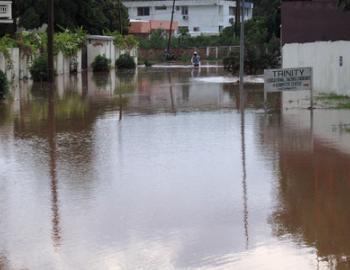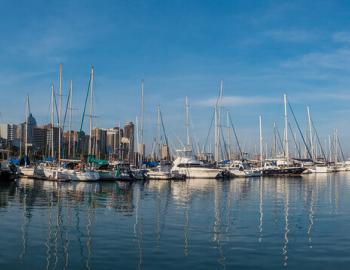Supporting climate resilience in Ghana
Supporting climate resilience in Ghana
Since 2019, CDKN has been working with the University of Ghana’s Institute for Environment and Sanitation Studies (IESS) to implement some of the country’s climate-change related focus areas as stated in the National Climate Change Plan (NCCP). CDKN’s work in Ghana has been led by the Country Engagement Lead, Dr Christopher Gordon.
Context
Of the four CDKN major themes - climate finance, water-energy-food nexus, cities and gender - three themes emerged as the most useful entry points for engagement, based on the interests of priority stakeholders in Ghana. The rationale for each is detailed below.
The rationale for the cities theme: Flooding is the main climate-induced challenge faced by Accra, the capital city of Ghana, and its peri-urban areas. A number of factors can be attributed to the current increase in flooding events. These include poor drainage (due to the lack of infrastructure), urban sprawl and an increase in the intensity and unpredictability of rainfall. The management of these flood disasters in the city by Municipal and District Assemblies has been the key challenge identified by the team, making the case for transdisciplinary work between researchers, practitioners and policymakers.
The rationale for the WEF nexus theme: The WEF nexus plays a prominent role in the NCCP of Ghana as well as in the Ghana NDC document. All the currently funded Green Climate Fund (GCF) projects are linked to WEF. The CDKN Ghana team has chosen this theme because of its significance in the developmental process of the country.
The rationale for the climate finance theme: Climate finance, though not a new concept, is relatively unknown by most people in Ghana. There have been several government and NGO engagements on climate finance, however further dissemination is needed for it to be well-understood, especially at the local level.
Project objectives
Since early 2019, the Ghana team's focus has largely been on working with local government to achieve these project objectives. This approach became necessary due to the part played by Municipal and District Assemblies (MMDAs) in the implementation of the NCCP, who are encouraged to use a portion of their annual budget for climate change related issues, which include disaster-risk reduction. CDKN Ghana, using the above as its focus areas, seeks to achieve the following objectives by the end of the programme:
- Collaborate with key stakeholders to inform the implementation and mainstreaming of the National Climate Change Policy.
- Build relationships between researchers and key actors by providing a platform for collaboration to generate greater clarity on approaches used by different Municipal Assemblies to handle flood risk.
- Improve the knowledge of rural people about the use of banking services.
- Encourage peer-to-peer learning on the successes of climate finance among financial institutions in Ghana.
Project activities
- Provide a peer learning platform for the collaboration of local government institutions on ecosystem-based disaster risk management.
- Produce knowledge products.
- Organise events to bring key stakeholders together.
Project outputs
The project’s key outputs are:
- A policy brief on district-level collaboration for flood mitigation in Accra, Ghana
- A scoping report and information brief entitled Ecosystem-based flood management: A comparative study report on the City of Cape Town and Durban (South Africa), Nairobi and Mombasa (Kenya)
- A workshop report on Gender and Climate Finance in Ghana
- A report on the Youth Forum on Water, Energy and Food Nexus
- A Flood Solutions Dialogue for MMDAs and Stakeholders workshop report
- “What’s in it for Ghana?” IPCC briefs series
Partners: National Disaster Management Organisation (NADMO) Ghana, Adenta Municipal Assembly


